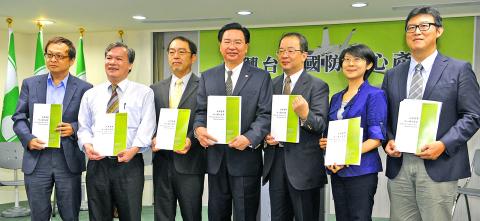The Democratic Progressive Party (DPP) yesterday made public its blue paper on national defense, vowing to push for domestically made submarines as well as next-generation warplanes if it returns to power in the 2016 presidential election.
“The DPP is determined to revive national defense,” DPP Secretary-General Joseph Wu (吳釗燮) told a news conference at the party’s headquarters yesterday morning. “Our first determination is to promote Taiwanese-built submarines and the self-production of warplanes, and our second determination is that the DPP create an open and competitive environment to promote upgrading the national defense industry.”
He said that if the DPP returns to power in 2016, it would make sure that national defense budgets would be at least 3 percent of GDP, which would be an increase of approximately NT$110 billion (US$3.61 billion) over the current average national defense budget of NT$319 billion.

Photo: George Tsorng, Taipei Times
“We would make sure that our armed forces would have the best equipment with a sufficient budget,” Wu said. “It would also help to boost the economy and create more employment opportunities.”
Chen Wen-cheng (陳文政), an assistant professor at Tamkang University’s Graduate Institute of International Affairs and Strategic Studies who also attended the press conference, supported the DPP proposal.
“Although arms purchases are often seen by top officials in the national security system as important in Taiwan’s collaboration with foreign allies, arms deals could also often become deadlocked due to political issues,” Chen said, adding that it is therefore important for the nation to have the capacity to produce its own military equipment.
Wu said that he would take the blue paper to the US-Taiwan Defense Industry Conference set to begin tomorrow in Williamsburg, Virginia, to discuss the party’s national defense policies with US officials, think tank members and Taiwanese defense officials.
“There will be no partisan division, though partisan division is normal in a democracy like Taiwan. When we are abroad, we all represent Taiwan — regardless of party affiliations,” Wu said.
The paper was the seventh of 12 blue papers the DPP plans to publish before May next year to present a full picture of the party’s national defense policy.
A source within the party said that the previous papers have been well-received among the national defense circle in the US.

Taiwan is stepping up plans to create self-sufficient supply chains for combat drones and increase foreign orders from the US to counter China’s numerical superiority, a defense official said on Saturday. Commenting on condition of anonymity, the official said the nation’s armed forces are in agreement with US Admiral Samuel Paparo’s assessment that Taiwan’s military must be prepared to turn the nation’s waters into a “hellscape” for the Chinese People’s Liberation Army (PLA). Paparo, the commander of the US Indo-Pacific Command, reiterated the concept during a Congressional hearing in Washington on Wednesday. He first coined the term in a security conference last

A magnitude 4.3 earthquake struck eastern Taiwan's Hualien County at 8:31am today, according to the Central Weather Administration (CWA). The epicenter of the temblor was located in Hualien County, about 70.3 kilometers south southwest of Hualien County Hall, at a depth of 23.2km, according to the administration. There were no immediate reports of damage resulting from the quake. The earthquake's intensity, which gauges the actual effect of a temblor, was highest in Taitung County, where it measured 3 on Taiwan's 7-tier intensity scale. The quake also measured an intensity of 2 in Hualien and Nantou counties, the CWA said.

The Overseas Community Affairs Council (OCAC) yesterday announced a fundraising campaign to support survivors of the magnitude 7.7 earthquake that struck Myanmar on March 28, with two prayer events scheduled in Taipei and Taichung later this week. “While initial rescue operations have concluded [in Myanmar], many survivors are now facing increasingly difficult living conditions,” OCAC Minister Hsu Chia-ching (徐佳青) told a news conference in Taipei. The fundraising campaign, which runs through May 31, is focused on supporting the reconstruction of damaged overseas compatriot schools, assisting students from Myanmar in Taiwan, and providing essential items, such as drinking water, food and medical supplies,

Prosecutors today declined to say who was questioned regarding alleged forgery on petitions to recall Democratic Progressive Party (DPP) legislators, after Chinese-language media earlier reported that members of the Chinese Nationalist Party (KMT) Youth League were brought in for questioning. The Ministry of Justice Investigation Bureau confirmed that two people had been questioned, but did not disclose any further information about the ongoing investigation. KMT Youth League members Lee Hsiao-liang (李孝亮) and Liu Szu-yin (劉思吟) — who are leading the effort to recall DPP caucus chief executive Rosalia Wu (吳思瑤) and Legislator Wu Pei-yi (吳沛憶) — both posted on Facebook saying: “I